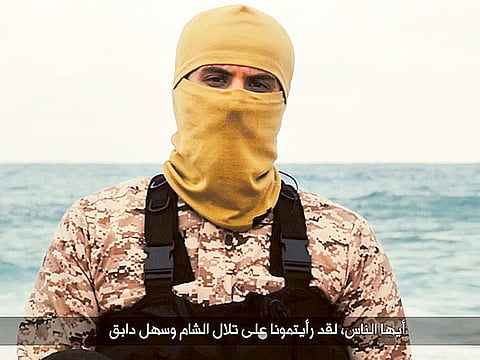US air strike kills Daesh leader in Libya
Strike is first time US targets Daesh outside of Syria and Iraq

Washington: A US air strike is believed to have killed the leader of the Daesh affiliate in Libya, Pentagon officials said on Saturday, in a mission that did not appear to be related to the terror attacks claimed by the group in Paris.
Pentagon press secretary Peter Cook said the strike took place on Friday and targeted Wissam Al Zubaidi, also known as Abu Nabeel Al Anbari, who commands what is the Daesh’s strongest branch outside of Iraq and Syria, according to US intelligence officials. The former Iraqi police officer was dispatched to Libya in 2014 by Daesh leader Abu Bakr Al Baghdadi to build up the group’s affiliate there.
Before going to Libya, Al Zubaidi was a senior Daesh operative in Iraq. Like Al Baghdadi, he spent time in a US prison in Iraq following the 2003 American invasion.
In a statement, Cook said that Al Zubaidi may have been the spokesman in a gruesome video that showed the killing of 21 Egyptian Christians on a beach in Libya earlier this year.
Defence officials, speaking on the condition of anonymity to discuss details of the operation, said the attack involved two US F-15 aircraft that struck a small compound outside Derna, a militant stronghold in eastern Libya. Several other people were in the same building at the time of the strike, officials said.
While officials are still assessing results of the operation, the strike was believed to have killed Al Zubaidi. Officials said the attack had been planned for some time and was not linked to Friday night’s violence in Paris, which killed at least 129 people and was among the worst terrorist attacks on Western soil since September 11, 2001.
The Daesh has asserted responsibility for the coordinated assaults in Paris.
Friday’s air strike was the first time that the United States has struck a Daesh operation outside of Iraq and Syria that US officials believe is under the command and control of the core organisation’s leadership.
Militants in places such as Afghanistan and Nigeria have affiliated themselves with or declared allegiance to the Daesh, but US officials think those group’s operations are not directly linked to leaders in Iraq and Syria.
In Libya, the presence of Al Zubaidi, who headed Daesh operations in central Iraq before travelling to North Africa, signals a different level of connection, officials said. Since earlier this year, Daesh militants have consolidated their control of Sirte, a coastal city in Libya now under the group’s harsh form of rule.
Intelligence officials say the Daesh is a hybrid operation in Libya, led partly by foreign fighters and partly by Libyans with extremist sympathies or who have felt disenfranchised in the years after the 2011 war that ousted Muammar Gaddafi.
Senior militants in Libya appear to have drawn from the experience the group has acquired during its growth across Iraq and Syria, using many of the same propaganda and enforcement measures to attract followers and discipline the local population.
Derna, far to the east of Sirte, is not controlled by the Daesh but has long been a haven for Islamists.
Daesh has been able to thrive in Libya in large part because of the country’s political instability four years after its revolution. Since last year, Libya has had two governments vying for resources and legitimacy. But neither is able to impose security across the vast desert nation or curb a sprawling array of militias, militant cells, smugglers and criminal groups.
Sign up for the Daily Briefing
Get the latest news and updates straight to your inbox



